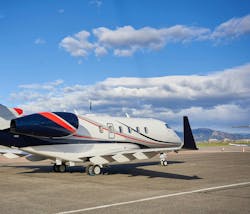Gogo Aviation installs Galileo HDX on Challenger 300
BROOMFIELD, Colo. - Gogo Business Aviation in Broomfield, Colo., in collaboration with Duncan Aviation in Lincoln, Neb., announced it has completed the first installation of its Gogo Galileo HDX system on a Bombardier Challenger 300 and begun flight testing as it prepares to launch its Low-Earth Orbit (LEO) global broadband solution later this year.
The installation on the Challenger 300 required adding a fuselage-mounted antenna, connecting it to the aircraft's power system, and linking the antenna to the pre-installed AVANCE L5 line replaceable unit (LRU). Similar installations are expected for around 4,000 aircraft equipped with Gogo's AVANCE platform.
"Our expert team completed the installation and, alongside Gogo’s engineers, began testing the system on the ground with eight devices connected and streaming simultaneously," said Mark Winter, Duncan Aviation Houston Satellite Manager. "It was impressive, and we’re confident that customers upgrading to Gogo Galileo will see significant improvements in connectivity."
Related: Gogo and Skyservice announce 5G STC development partnership
Gogo is moving into the next phase of testing, which includes electromagnetic interference (EMI) tests, vibration and buffeting checks, and an extensive flight-testing campaign to refine system performance.
"Reaching this milestone puts Gogo Galileo HDX on track to launch in the fourth quarter, on time and on budget," said Sergio Aguirre, Gogo's president and chief operating officer. "Gogo Galileo customers will experience reliable service on the Eutelsat OneWeb LEO satellite network, which does not share bandwidth with consumer users."
As of Gogo's second-quarter earnings report, the Galileo HDX system has eight Supplemental Type Certificate (STC) programs in place covering 5,318 aircraft, with 21 more in development, potentially covering an additional 12,267 aircraft.
The HDX antenna, designed for business aircraft, offers mean speeds of 57 Mbps and peak speeds up to 60 Mbps. A larger antenna, the Gogo Galileo FDX, is expected in 2025, offering speeds up to 195 Mbps for larger aircraft.
Gogo is moving into the next phase of testing, which includes electromagnetic interference (EMI) tests, vibration and buffeting checks, and an extensive flight-testing campaign to refine system performance.
